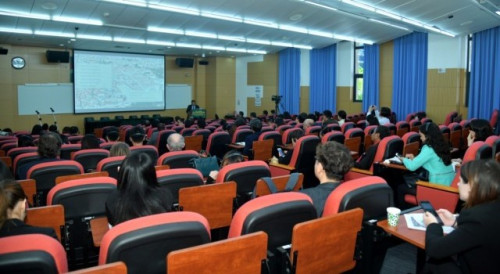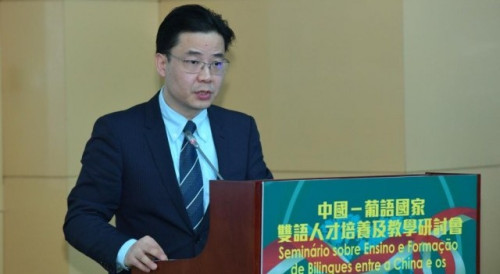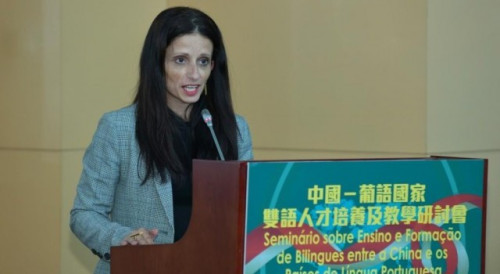The “Workshop on Teaching and Training of Bilingual Professionals for China and Portuguese-speaking Countries”, organised by the Permanent Secretariat of the Forum for Economic and Trade Co-operation between China and Portuguese-speaking Countries (Macao) and the University of Macau, was successfully held on December 7 and 8 in Macao. The event was co-organised with the Macao Trade and Investment Promotion Institute and supported by the Tertiary Education Services Office.
More than 100 experts and academics from higher-education institutions from Mainland China, Macao or Portuguese-speaking Countries took part in the workshop, as well as officials from relevant services of Portuguese-speaking Countries, and representatives from Macao’s industrial and trade sectors, including those from trade and business groups, accounting firms, and auditing and legal firms. Together they discussed issues related to the training of professionals bilingual in Chinese and Portuguese.
During the two days of the workshop there were three themed speeches and two parallel sessions. A number of important topics was discussed in depth during these sessions, focusing on Macao’s role as a platform for promoting the development and the deepening of social, cultural and economic contacts in a multicultural environment. The role of the Portuguese language and of the training of professionals bilingual in Chinese and Portuguese in the cultural, economic and trade fields was also discussed. The need, within relevant economies, for staff bilingual in Chinese and Portuguese – and the opportunities and challenges presented in the training of such staff – were also topics discussed.
Deputy Secretary-General of the Permanent Secretariat of Forum Macao, Mr Ding Tian, and the Director of the Chinese-Portuguese Bilingual Teaching and Training Centre, Prof. Ana Nunes, gave the closing speeches of the workshop.
Mr Ding said that during the 15 years since the establishment of Forum Macao, trade relations between China and Portuguese-speaking Countries had been continuously developing and deepening. Cooperation had broadened to new areas and grown dynamically and as a result the need for talented people bilingual in Chinese and Portuguese was increasing.
Macao – due to its role as a place for cultural exchanges between China and the Portuguese-speaking Countries, and its inherent linguistic and cultural advantages – was also an important link for trade exchanges between China and Portuguese-speaking Countries.
Following the establishment of the Training Centre of Forum Macao in 2011 – with the cooperation and support of the Training Centre of the Ministry of Commerce of the People’s Republic of China, and of Macao’s higher education institutions, as well as of social groups and enterprises – the city had begun to offer to the relevant authorities and to social and business representatives of the involved places, opportunities to study several topics related to the Portuguese-speaking Countries. The Permanent Secretariat would continue to support the Macao SAR Government in building a training base for cadres, that would promote Chinese-Portuguese bilingualism. This would help fully underpin Forum Macao’s role as a bridge, while also effectively stimulating the training of those with relevant talents for bilingualism, and would actively contribute to greater and more profound success in cooperation in various areas between China and Portuguese-speaking Countries.
Prof. Nunes underlined that economic and trade exchanges between China and Portuguese-speaking Countries were becoming more frequent and, consequently, there was a growing need for people with talent for relevant bilingualism. She emphasised the need to improve students’ linguistic proficiency, taking into account the opportunities and needs of the market. Such training would also have the effect of boosting the transfer of knowledge acquired in other areas of the economy, and make more versatile those people with the bilingual skills to make that happen. Such knowledge transfer was one of the goals of the workshop, as well as one of the most important targets for achievement, as far as the Chinese-Portuguese Bilingual Teaching and Training Centre was concerned.
Thanks to the efforts of all parties, the workshop was successful, promoting dialogue and exchanges between representatives respectively from the academic and educational sectors, and those from the commercial and industrial sectors. The workshop was a great inspiration regarding the direction of future training of bilingual staff, and would help ensure they were able to operate pragmatically and be effective in their work. At the same time, through the Macao platform, cultural ties between China and Portuguese-speaking Countries were deepened by the workshop.








